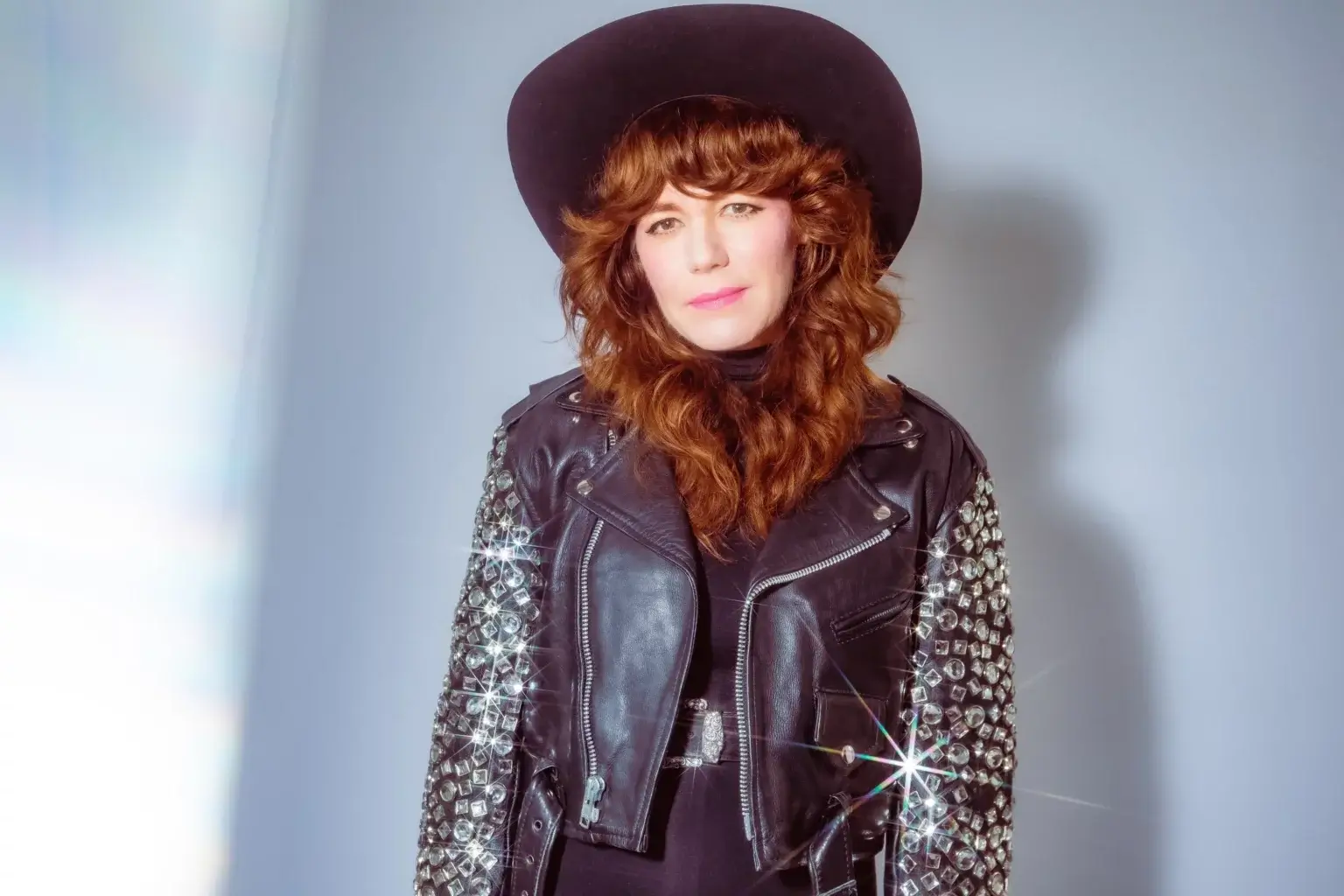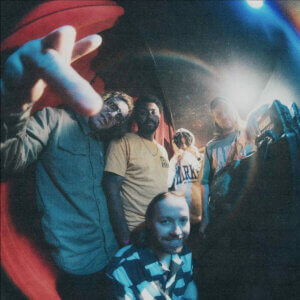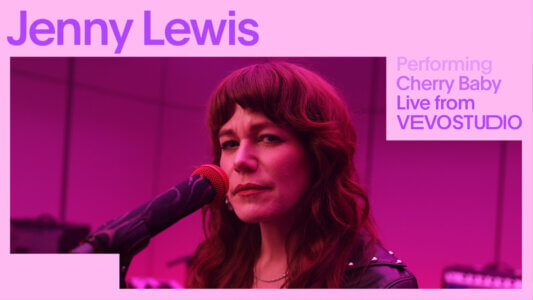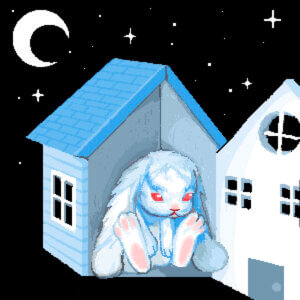Pony Interviews Jenny Lewis

Don’t meet your heroes, unless your hero is Jenny Lewis
A conversation between Jenny Lewis and PONY
On her new album Joy’All Jenny Lewis is taking the pressure off. A songwriting workshop, a casual run in with a Grammy Award winning music producer, simply having the time to watch her story arc develop. She’s taking it all as it comes and getting wiser every day.
For a lot of people making music today Jenny has been a central figure in their musical universe and PONY are no exception to that. We were lucky enough to get to talk to Jenny about her songwriting, the journey between records and a lot of things off the beaten path. She was kind and gracious with us the whole way through. They say you shouldn’t meet your heroes, but Jenny is a joy to all.
Matty: All right. Are you ready to get in to it?
Sam: Thank you so much for chatting with us.
Jenny: Wait, one quick question before we get into it. So, have you ever gotten really bad brain freeze? Like, crippling? Just the other day I was having a frozen margarita at this place called Chuy’s, which is at the Opry Mills Mall where I live in Nashville. It’s like Opryland and then there’s a mall. There’s this Mexican chain called Chuy’s. That great Purple Mountains song of David Berman‘s about drinking margaritas at the mall, I think it’s this mall. So I got a frozen margarita and luckily I was with my two friends, but I had such bad brain freeze that I had to like put my head down on the table. It’s like, it’s terrible.
S: It’ll get you. It’s like an unbearable pain sometimes!
J: And they say to put your tongue on the roof of your mouth. It doesn’t work.
S: It doesn’t work! Your tongue is not hot enough because it’s also in your mouth and it’s
cold.
J: What is brain freeze? And why does that happen?
M: That’s a feeling that God definitely did not intend for us to feel. That’s something of our own creation.
S: A glitch.
J: Yeah, right. It’s just too cold. It’s not natural.
S: No.
M: Are we ready to get into the little formal interview part?
J: Oh, yes. Even though shooting the shit is just great.
S: It’s just fun. It’s just fun and lovely. We love the record, by the way. We should start by saying.
M: Yeah, congratulations on the new record. It comes out June 9th.
J: June 9th, which I think is Friday.
S: Dude, it is so good.
J: Yay, thank you.
S: What a delight to have been able to hear it before everyone else.
J: It’s short! It’s only 30 minutes.
S: It’s perfect.
M: 30 minutes is my ideal record length.
S: That’s the perfect length because you put it on and then as soon as it’s done, you want to listen to it again!
J: I think my personal attention span is very limited right now, after being on my phone, on my couch for a couple years. I didn’t have the patience for 30 more minutes of me.
S: Totally. Absolutely relatable.
M: You gotta leave them wanting more.
J: You have to leave yourself wanting more.
M: Is it exciting for you to release the record? or does it feel like closing the cycle and now you’re like “oh, I have to get back to work”?
J: Well, I think the more records you put out, you lessen the importance on each one. Not that they’re not all very important, but they are in a line of work. So, I’m very excited to play these songs with the band. And then once it’s out there, it’ll free up some space for the new whatever it is. The first one that you write after you put something out is very interesting. You know, like what do you do? it’s usually a reaction or a response to the thing before. I don’t know if you guys have experienced that. I don’t know how many records you have made. How many records have you made and put out?
S: We just put out our second.
M: Yeah, so we just experienced this.
J: Sophomore slump, question mark?
M: I think we got kind of lucky because we put out our first record in the depth of lockdown. Which doesn’t sound lucky, like we didn’t get to tour it or anything and it just kind of came out and existed. But now that we’re putting this one out, I feel like we had so much time to really sit and figure out what we were trying to do, and what we wanted it to sound like, and to just focus on songwriting, that this second record is sort of like our… It feels like our first.
S: It feels like a debut, in many ways.
J: Well, in a way, the last couple years have afforded us a little space and room to either work on stuff or not. I found it really helpful from a personal standpoint. I needed a break just to let myself off the psychic hook. It’s like days-off on tour where you’re nowhere and you’re just like “this rules”.
S: Yeah, there’s no pressure to create anything or be anything other than a human being.
J: Which when you’re a creator and an artist, that is what we just do, but then there’s this external pressure to do more of it, or talk about doing it or whatever it is. So yeah, just having the space to just create is pretty cool.
M: Making our second record, we actually were also working from a songwriting prompt situation. We were doing the one song a week thing. You talked about how a bunch of the songs on your record came from a songwriting prompt that you did with Beck. Is that a way that you’ve written before? Have you done the prompt thing?
J: No. Not even close.
M: How did you feel about it?
J: I loved it. Because I was in the spot where I could do it and feel comfortable because it was virtual. I would never do that IRL.
S: Yeah, that is terrifying.
J: Thank you, Zoom or whatever for enabling that. But yeah, I loved it. It was a really interesting thing to learn different ways of writing a song. Not just from the channeling magic part. Some of my friends they write songs where they’re like, “I’m gonna write a song about this” with a concept and I’m like, “I’ve never written a song with a concept”.
S: Yeah, or just having to like sit down to be like “what traumatic event am I going to dig up from the depths of me today to try and be poetic?”. Having a prompt is a nice way to take the pressure off of your own trauma and still be able to make something of value.
J: Totally, and I think trauma mining is rich. I’ve made an entire career out of it. But writing with a prompt like, write a song of all cliches, or write a song with 1-4-5, or write a song with an existing piece of text? That’s interesting.
S: Yeah, it at least gives you a place to jump off from.
J: I guess if you run out of things to write about.
M: Yeah, and it’s also that thing you mentioned before where sometimes it’s like you’re sitting down to write a song and it feels like you’re just trying to will something out of the air, you know? If it doesn’t happen, it feels kind of like a failure in a sense that feels so personal. But then when you’re writing from a prompt, it’s like, at least you can blame the prompt maybe.
S: The stakes are a little lower.
J: Songwriting is so interesting and the pressure and the non-pressure and the like, what is coming through you and then the homework that you do afterwards and the comparisons that you’re making as you’re writing, just your influences. Even if you’re not referencing a song, it’s a part of you. That song and what you like. So it’s gonna come through your work.
S: Absolutely, and the songs on this record feel very vulnerable, but they also feel very empowering. I was wondering if it was a conscious choice that you were making while writing to showcase power in vulnerability or did that just come out organically through the personal journey you were having?
J: I think the empowerment comes from going through it and surviving. In making a record over a two-year period you have the luxury of that story arc because it’s a fair amount of time. I didn’t feel like I had to make a record or get it out… Hopefully you come out of it with a little more wisdom. In the song Joy’All, it’s like my favorite line on the whole record and when we play it live I just like get so amped. It’s like, “but we get a little bit wiser every day”, which is true!
S: It’s so true. I feel like this record is also a record about growing up. You’re always growing up, and you’re always like evolving, and you’re always learning.
M: It doesn’t stop.
S: Yeah, it doesn’t stop. I think there’s this expectation that at some point we reach an age where we should have it all figured out. It’s so refreshing to hear this body of work that’s like, “nah, dude, we’re all still figuring it out day-by-day”. It’s cool stuff.
J: Well, thank you for saying that. When you are 47, you’re gonna be like, aha! That is part of the process. We get a little bit wiser every day. I’m just a little bit farther down the fucking train tracks or whatever. There’s this great Zen poem or like, meditation exercise where you just imagine yourself on a train track that’s going nowhere and it hasn’t come from anywhere and that’s like your breath. It’s just this constant. I think if you think of yourself in that way when you’re an artist it lets you off the hook because whatever you’re gonna do, It doesn’t matter. You’re just growing as an artist and it’s all valid, even your first crappy song.
M: Yeah, it’s like taking yourself out of out of the cycle of the beginning and end. Letting go of that element of the suffering of being alive.
J: And the suffering of being an artist. It’s agonizing!
M: It’s true. You’re taking the risk. You’re always taking the risk.
J: When we remove ourselves from like, the TikTok paradigm or whatever it is in the moment that seems really important, it’s not.
M: Well that actually brings me around to another question I wanted to ask you. Without disclosing our age, we’re right in the window where you’ve kind of been an omnipresent figure in my little musical universe. From my earliest memories of being involved in music and trying to write music, it was Rilo Kiley straight through to now. You’ve had this kind of longevity and perpetual-cool that a lot of artists don’t really get to have, you know? When you were making the choices for the style of the record or changes that you were making in your songwriting was that ever something that you had in mind?
J: No, I certainly didn’t have that in mind, but I guess I’ve always tried to keep things as authentic to the moment that I’m in personally and so I haven’t had these crazy big moments in my career. It’s been kind of steady. It’s allowed me to really be myself and not really try to write a hit song just for the sake of it or whatever comes along with that stuff. I said no to some stuff that maybe I should have said yes to but yeah, I think it’s just been the result of flying a teeny bit under the radar.
M: Yeah, there’s definitely a benefit to that.
J: Yeah, it’s like kind of chill, kind of not, but it’s not too much, you know? I don’t think I could have handled any more success.
S: it’s nice that you never had to compromise yourself in order to fit in. You kind of carved your own space, which I think is what probably contributes to that longevity.
J: Yeah, but if let’s say Rilo Kiley had a true hit song, that would be a game changer. Imagine? It’d be at all the karaoke bars.
S: I’ll sing Rilo Kiley at karaoke any day. I’ll do the smoke detector at karaoke every day.
J: There was an actual dance.
S: I’m gonna learn it. For this record, you mentioned that you were demoing songs on your iPhone. Can you talk a little bit about what that process was like?
J: I’ve demoed every single song that I’ve written, from the beginning. Starting on like a little tape player with just one record function to a four track that I got when I was 17. Then early garageband on a computer. And then I didn’t want to have a computer anymore so I started garagebanding on my phone. I’ve been doing those garage band phone things for the last three records, so they’re all on there. I don’t have an external mic or a MIDI. It’s all live to a click if it’s the rhythm section. I love the way the drum sound recording on your iPhone with just that speaker. I feel like it’s a magic blown out sound.
S: It sounds so cool.
J: And then I’ll do mega vocal stacks. I love now playing with the world instrumentation, just on the phone where you can kind of do these fun, you know, if you’re on a plane or…
S: In the van.
J: In the van! I’m not a Luddite when it comes to that stuff. I like new tech stuff that makes it easy to be creative.
S: Yeah, most of our new record I wrote on GarageBand on my phone too, just because I was like, I can bring this with me anywhere. I can work on a little tiny song anywhere!
J: It sounds so good too, doesn’t it?
S: It blows my mind sometimes when I listen to it. I’m like “how does this sound so cool?”.
J: You can be your own engineer. You can put a little auto tune on it if you want, or some reverb. Whatever it is, you can affect your vocals in a way that no one ever lets you do because they’re like, “you have a great voice, don’t put any reverb on it!”
S: Oh my god. You can have like, a quad vocal and it just sounds so ethereal and you’re like, “yes, this is what I want to sound like” and then you get to the studio and the engineer’s like, “I don’t want to double your vocals” and you’re like “I’m going to kill you.”
J: John Lennon doubled his vocal. That’s what you have to say next time.
S: If it’s good enough for John…
M: You say John Lennon or Robert Pollard, depending on who you’re talking to.
J: Oh, I love Robert Pollard.
M: Me too.
J: I love that band. Bee Thousand? That is the sickest. That’s the name of that record, right?
M: Yeah.
J: The sickest.
M: Huge, humongous.
J: But huge hooks, like so poppy. I like pop music! I feel like the like indie music that I gravitate towards is just so poppy.
M: That’s us too.
S: Yeah, that’s us too. And people are always trying to be like “you guys love grunge” and we’re like, well, we actually just love pop music with a capital P. But we also love guitars.
J: Grunge is tight.
M: Of course! For sure, but…
J: I mean Live Through This is one of the best records ever.
S: Totally.
M: Celebrity skin was a huge guitar tone reference on both of our records.
J: That record is the best.
M: The best sounding guitar I’ve ever heard in my life.
J: Courtney was so dope.
S: So cool. She’s the coolest.
M: Prior to Garage Band World I don’t really know how anybody ever wrote a song. I don’t know how I wrote a song before figuring out home recording and stuff. Having that be accessible and especially having it be something on your phone where… I can’t play piano, but I can put piano on a song when I make it on my phone, you know? You just pull chord strips and choose the key.
J: Or working out the lyrics. I’ll demo a whole song, you know, drums, bass, keys, guitars, and then I’ll just leave the verses blank that I haven’t written yet. I build it out. Chorus, bridge, first verse, last verse. And then I just listen to it over and over while I’m mixing it and then the words come for the other parts. It’s like an incredible tool.
S: It’s so interesting to be able to write a song that way because I do the same thing and before I was so confined to just being able to play the chords on guitar and have to write a melody and lyrics as I’m writing the song on guitar. But when you do it this way you can give a song life, let the song decide what it wants to be, and then come back and be like, “okay, what do I want to say now?” now that the song is where it wants to be.
J: Well, there are different ways to make songs. There are all sorts of permutations that are all really fun. I think when you’ve been doing it for a while, you just try new things, like the Beck songwriting thing. What was the songwriting workshop you guys did?
S: We were watching a list of the hundred best television episodes of the century and using each episode every week as a prompt for a song. So we were writing songs all about TV shows.
J: What were some of the examples?
M: The ones that made it to the record were one about the Pine Barrens episode of The Sopranos.
S: America’s Next Top Model. Gilmore Girls. I think that might be it.
J: That’s pretty good.
S: Yeah, it’s an eclectic list, so there’s a lot on there.
M: It was fun!
J: So fun. Now for the next one, how are you approaching the songs?
M: I don’t think I’m ready to think about that yet.
S: I’ve just been writing crumbs. I’ll just write like eight bars here and there to try and like accumulate a lot of stuff so that when we do sit down to talk about the next record, we have lots to pick and choose from.
J: So, you’re crumming, basically?
S: I’m crumming, exactly.
J: You’re crumbing yourself.
S: I’m just crumbing everywhere I go.
M: This is your first time working with the producer Dave Cobb. What do you look for in a good fit for a producer? What made you feel like this was going to work?
J: Well, I met him, my friends were making a record at his studio. I just went in to hang and I just liked him. The space is this historic RCA Studio
A. It’s insane. I had been living in Nashville for a couple of years, but to go to a studio on Music Row, where all of the greats recorded on the property? It was pretty easy. And of course, Dave is great. It was very serendipitous. It didn’t feel at all business-y, which is what I tend to like more than the other thing. All of my collaborations tend to come from organic proximity. And then I started looking around, I was like, oh my goodness, this guy has a lot of Grammys! I better get my songs together!
M: Well, if there’s one thing that you want people to take away from the record what do you want it to be?
J: I mean, it’s a little on the nose, but I hope there’s a little bit of joy in there. Truly, I mean it! Joy to all. It sounds so cheesy but…
S: It doesn’t sound cheesy. I think that it’s truly like what we need. I love the record, and I think that it’s a beautiful way to showcase turning pain into joy, and I think that you just nailed it. It’s so lovely and wonderful and we’re obviously huge fans of yours and it was so great to get to talk to you today.
J: Well, sometimes I feel like with people who started listening to Rilo Kiley first I’ll never be good enough on my own without the band. Seriously, I have a bit of a complex where it’s like, “well, you would much rather hear that.” I’m not saying you guys. I feel like I’m just like living up to this thing. I almost feel like an outlaw within my own mind, in that context. So, I very much appreciate hearing that from you guys considering you know the whole story.
M: We love being on the journey. I’m excited for every record to come out. I’m always excited to see where you’re going to go with it. It’s like the ideal career for an artist, to be honest.
J: Thanks, I wouldn’t recommend it. Just kidding!
M: I wouldn’t recommend any of this to anyone but we’re all too deep in it to get out now, so!
We appreciate you talking to us.
J: Great meeting you both. Can’t wait to listen to more of your music. It’s great.
JENNY LEWIS 2023 LIVE DATES
06/02/23 – Nashville, TN – Ascend Amphitheater ^
06/03/23 – Lexington, KY – Railbird Festival
06/17/23 – Manchester, TN – Bonnaroo
07/06/23 – Milwaukee, WI – Summerfest
07/07/23 – Chicago, IL – The Salt Shed &
07/08/23 – Duluth, MN – Bayfront Festival Park #
07/12/23 – Detroit, MI – Majestic Theatre &
07/13/23 – Cleveland, OH – House of Blues &
07/15/23 – Boston, MA – Roadrunner @
07/16/23 – New Haven, CT – College Street Music Hall @
07/18/23 – New York, NY – The Rooftop at Pier 17 @
07/20/23 – Philadelphia, PA – The Met Philadelphia @
07/22/23 – Washington, DC – The Anthem @
08/01/23 – Seattle, WA – Climate Pledge Arena
08/03/23 – Bend, OR – Hayden Homes Amphitheater *
08/05/23 – Concord, CA – Concord Pavilion *
08/07/23 – Los Angeles, CA – Kia Forum *
^ with Ruston Kelly
# with Trampled By Turtles
* with Beck, Phoenix
@ with Cass McCombs, Hayden Pedigo
& with Jenny O., Hayden Pedigo
Order Joy’All by Jenny Lewis HERE
Order Velveteen by Pony HERE
Latest Reviews
Tracks
Advertisement
Looking for something new to listen to?
Sign up to our all-new newsletter for top-notch reviews, news, videos and playlists.









